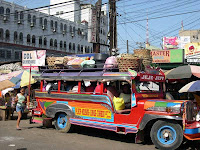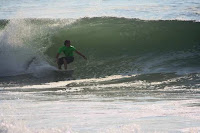Riding a Jeepney can be a fun experience for the tourist here and it is a cheap alternative to taxi cabs for getting around, but there are a few things you should know before you take that first Jeepney ride.
First, most are open air, which means if you are stuck in traffic, be prepared to cover your face with a handkerchief because of exhaust fumes. Next thing to take into account is if you are tall you may want to sit near the exit because the ceilings are low and you may prefer not to try to work your way to far inside to get a seat. One more important point to keep in mind is the drivers have a tendency to pack as many people as possible into one, so sometimes it a tight fit inside. The attitude seems to be, there is always room for one more. Some passengers will stand on the protruding platform at the rear of the Jeepney as well because of that.
When it comes time to pay the fare it is a good idea to have the exact change or at least some of the local currency in small denominations. It you are sitting towards the rear and the Jeepney is crowded you can just reach out at arm’s length and another passenger will pass your fare down to the driver. Sometimes the Jeepney driver will have a helper that rides on the back directing the passengers and collecting the fare, in which case you would just pay them.
When you want to ride a Jeepney you can catch one at a terminal or usually you can just hail one like you would a taxi and they will stop and pick you up. When you have reached your destination, just tap on the hand rail on the ceiling with a coin or key and they will pull over and let you out. This is common and the easiest way if the driver doesn’t speak your language, plus it beats yelling in some ones ear to stop. :-)
Riding a Jeepney can be a lot of fun despite the occasional annoyances like heavy traffic and sometimes be packed in like sardines. There are plenty available and are a cheap alternative to a taxi cab which have their draw backs as well.
Below is a video that takes a humorous, but mostly accurate view of how to ride Jeepney. I say mostly because I wouldn't recommend laying your head against someone else. With that said, it is an excellent video with some very good tips.
How to Ride the Jeepney in the Philippines
Visas, Embassy, Airlines and additional information is available in the lower left hand column.
The Jeepney
The Philippine Jeepney once considered the “King of the Road” in the Philippines continues to be one of the most popular modes of transportation despite economic and political pressure mounting against them. The Jeepneys originq can be traced back to the tens of thousands of American Jeeps left behind after WW2. The Filipinos saw an opportunity to convert the old jeeps into a form of public transportation.
The demand grew for the Jeepney and in 1953 Sarao Motors in Las Pias City, Philippines began manufacturing the Jeepney and would go on to become world famous because of it. At its peak the company was producing 18 – 20 Jeepneys a day, but the Asian economy and Government regulations began to take their toll and in October 2000 the company announced that production of the Jeepney was coming to an end.
Eleven years later the children of the late founder of Sarao Motors have reopened the plant, but it is only a fraction of what it once was, producing two – three Jeepneys a month. Nether the less the tradition continues and the company is looking into building more efficient models, including an electric Jeepney. That could alleviate some of the criticism aimed at the Jeepney, primarily that they are gas guzzlers and heavy polluters.
The Jeepney is unique and it is said, “That no two are alike.” The Jeepenys are custom painted and decorated quite elaborately by the individual owners. The Jeepneys are privately owned and not a source of transportation provided by the government. Throughout many parts of the Philippines the Jeepney is the main source of transportation and I hope the problems that are plaguing them now can be worked out and these unique vehicles can continue to provide a valuable service to the people of the Philippines.
Jeepneys of the Philippines
JEEP Judgement call
The demand grew for the Jeepney and in 1953 Sarao Motors in Las Pias City, Philippines began manufacturing the Jeepney and would go on to become world famous because of it. At its peak the company was producing 18 – 20 Jeepneys a day, but the Asian economy and Government regulations began to take their toll and in October 2000 the company announced that production of the Jeepney was coming to an end.
Eleven years later the children of the late founder of Sarao Motors have reopened the plant, but it is only a fraction of what it once was, producing two – three Jeepneys a month. Nether the less the tradition continues and the company is looking into building more efficient models, including an electric Jeepney. That could alleviate some of the criticism aimed at the Jeepney, primarily that they are gas guzzlers and heavy polluters.
The Jeepney is unique and it is said, “That no two are alike.” The Jeepenys are custom painted and decorated quite elaborately by the individual owners. The Jeepneys are privately owned and not a source of transportation provided by the government. Throughout many parts of the Philippines the Jeepney is the main source of transportation and I hope the problems that are plaguing them now can be worked out and these unique vehicles can continue to provide a valuable service to the people of the Philippines.
Jeepneys of the Philippines
JEEP Judgement call
Labels:
Jeepney,
Philippines,
Philippines transportation
Location:
Philippines
Palawan named world’s best island by Travel + Leisure magazine
The honors continue for the Philippines with announcement of Palawan being named the “World’s Best Island” by the New York based Travel + Leisure magazine. The official awards ceremony we will be held in New York City on July 18th.
UNESCOs recognition of the Palawan biosphere reserve in the Philippines for the Puerto-Princesa Subterranean River National Park and the Tubbataha Reefs Natural Park helped Palawan garner the award. Adding to the many attractions you can see in Palawan is a new resort with a scuba center. Palawan is an exceptionally beautiful archipelago that is only about a 2 ½ hour flight out of Hong Kong and it’s great to see it get some well deserved recognition. (for more click here and here)
Siargao Islands Cloud Nine named one of the Top 50 Surfing Spots in the world.
Cloud Nine in Siargao, Surigao del Norte made the top 10 of the world’s best surfing spots. Ranked 9th recently by CNN Travel on their list of, “World’s 50 best surf spots.” Siargao is well known by surfers all over the world as The Surfing Capital of the Philippines with a reputation for large barreling waves. The surfing season is generally considered to run from Sept – March with some of the best waves coming in Oct. – April though good waves can be found year round.
The Cloud Nine break at Siargao Island is the most famous wave there, but there are many other good waves in the area that surfers can enjoy. Siargao Island is also popular with surfers because it’s considered an inexpensive surfing destination and the people are so friendly.
Siargao Islands Cloud has been the home of many international surfing competitions for both men and woman, the most recent competition being the “6th Siargao Girls’ International Surfing Cup” held back in June.
Surfing Cloud 9 Siargao Island, Philippines
Subscribe to:
Comments (Atom)





